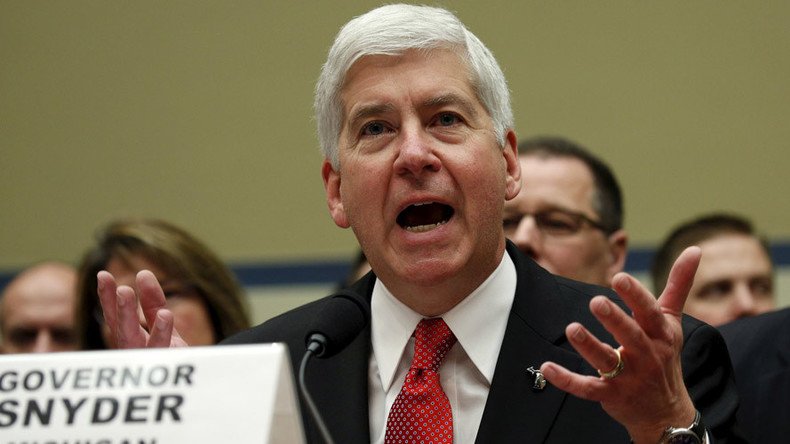Michigan governor announces Flint water crisis action plan

Michigan Governor Rick Snyder announced a 75-point action plan intended to address the ongoing lead-contaminated water crisis in Flint. The plan includes raising state water standards beyond federal requirements.
Revealed on Monday, the plan outlines a number of short, medium and long-term goals for the state to reach, including offering health care access for poisoned children age six and younger, adding three child health centers in Flint, expanding behavioral screening for kids under six, replacing lead service lines, and more.
BREAKING: The state's new comprehensive action plans are designed to help move #FlintFWD >> https://t.co/Ph4iMFtjFJpic.twitter.com/GTLJ4Y4cfB
— Governor Rick Snyder (@onetoughnerd) March 21, 2016
Notably, Snyder’s plan will make the entire state of Michigan comply with “a much higher standard” for water regulations than mandated by the Environmental Protection Agency’s Lead and Copper Rule. The plan doesn’t specify exactly what the new requirements will be.
Under the EPA’s current regulations, at least 90 percent of a city’s sampled water taps must have lead concentrations below 15 parts per billion to be considered safe. In the wake of the situation in Flint, though, the rule has been criticized as inadequate.
“We are committed to addressing immediate concerns and finding long-term solutions to improve the quality of life for the people of Flint,” the Republican governor said in a statement. “Many departments have been involved in addressing the immediate crisis in whatever way they could. At the same time, they have been working on longer-term plans that address Flint’s future prosperity. These action plans lay out our next steps as we continue to work together as one Michigan to solve the challenges residents may face.”
Flint water crisis loses 2 spokesmen in first round of March Madness tourneyhttps://t.co/NTOyUmA8ZSpic.twitter.com/BKu76OwG5B
— RT America (@RT_America) March 19, 2016
A key demand by Flint officials and residents is the replacement of all lead service lines in the city. Snyder’s new plan outlines support for such a project, but does not say when it would be completed. The state will replace 30 lead services lines under Mayor Karen Weaver’s Fast Start Program.
Snyder’s plan also calls for adding nine nurses to schools in the city and increasing resources for early education services to children up to age three.
The governor’s plan comes the week after his testimony about the crisis before Congress, where he faced intense questioning by lawmakers and was called on to resign for failing to act. Flint’s water became contaminated back in April 2014, after the city – under the control of an emergency manager appointed by the state – switched its water source from Detroit’s system to the more corrosive Flint River. Officials never treated the water with anti-corrosives and it leached away lead from service lines as it flowed towards homes and other buildings.
Although residents complained of dirty, smelly water immediately after the switch, state officials insisted for a year and a half that it was safe for consumption. Even after Flint switched back to the Detroit system in October, concerns remain over lead levels, due to the possibility that service lines have been permanently damaged.
In addition to addressing Flint’s water crisis, Snyder’s new plan involves initiatives that would help boost the financially struggling city economically – including redevelopment programs, mortgage lending or financing options for undervalued homes, and a job training program for at least 500 residents.
“We need the state to do all it can to help Flint recover and rise from this crisis,” said Ridgway White, president of the Flint-based Charles Stewart Mott Foundation, in a statement. “We’re pleased to see these robust plans, and our Foundation will continue to work with the state, the city and others to help meet the needs of Flint’s families.”













